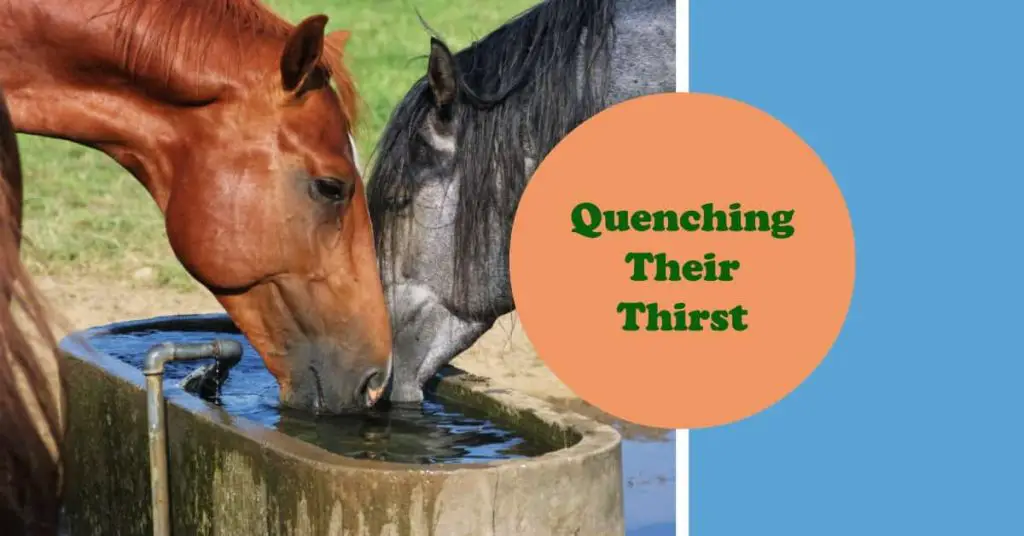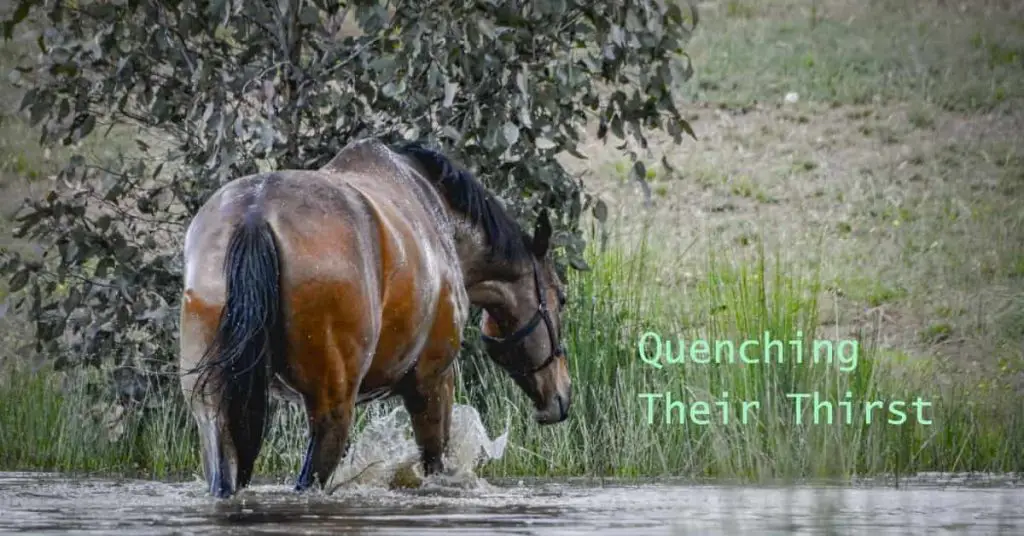How Do Horses Drink Water? Horses drink water by using their lips to form a vacuum seal around the surface of whatever liquid they are drinking from, be it a pond, stream or bucket.
This suction then causes the liquid to enter into the horse’s mouth and down its throat. Horses typically drink between 5-10 gallons of water per day depending on their size, activity level and environment temperature.
Additionally, horses can also lap up small amounts of water while keeping their noses out of the liquid due to their unique anatomy that allows them to close off one nostril at a time when submerged in water.
Horses can drink up to 10 gallons of water per day. They have the ability to take in large amounts of water very quickly, which helps them stay hydrated throughout the day. Horses are able to use their lips and tongue together to form a kind of suction pressure that allows them to suck up the water from a trough or pond with ease.
Horse owners need to make sure there is plenty of fresh drinking water available at all times as dehydration can have serious consequences for these majestic creatures.
Do Horses Drink Milk
Horses can drink milk, but it is unnecessary for their health and should only be given in moderation. Milk does contain essential nutrients that horses need, such as protein and calcium.
However, too much of it can cause digestive issues. It’s best to feed your horse a balanced diet of hay and grain supplemented with small amounts of fresh fruit or vegetables rather than relying on milk as the primary source of nutrition.
How Do Horses Get Their Water?
Horses need water to stay healthy and hydrated, just like humans do. So, how do horses get their water? Horses can access water in various ways.
In the wild, horses typically drink from lakes, rivers, or other bodies of fresh water. However, captive horses must have clean drinking water provided for them by their owners or caretakers.
This can come in the form of buckets filled with fresh tap water, which should be changed daily as needed; automatic waterers that hook up to a hose bibb and fill on demand; or troughs filled with clean rainwater collected from rooftops or drainage systems.
Additionally, some horse owners provide electrolytes in their horse’s drinking water to replace lost minerals during exercise and hot weather conditions.
It is best to keep your horse’s drinking areas away from manure piles so they are not accidentally ingesting waste material while getting a drink!

How Do Foals Drink Water?
Foals begin drinking water within the first few hours after birth. At first, they will need help from their mothers to drink properly.
The mare’s teats provide the foal with milk, but they also help teach the foal how to create a vacuum seal with their lips to suck up liquids. Foals will mimic this motion when drinking water.
Within a few days, foals figure out how to use their lips and tongue to form the vacuum seal on their own. This allows them to drink from buckets and other water sources. Foals tend to take small sips of water frequently throughout the day.
Do Horses Have a Special Anatomy for Drinking?
Horses have a few unique anatomical features that allow them to drink water efficiently. Their lips are prehensile, meaning they can grasp and manipulate objects.
This helps horses form a tight seal around water sources when drinking. Horses also have incisor teeth only on their bottom jaw. This allows them to tear and chew grass but leaves the top of their mouth smooth for drinking.
Additionally, horses have a large nasal cavity above their mouth that collects water as they submerge their nose. This water is then channelled to the back of the throat while keeping the airway clear.
Providing Clean Drinking Water for Horses
It’s critical to provide horses with a constant supply of fresh, clean drinking water. Stagnant water can harbour bacteria and parasites that make horses sick.
Water troughs and buckets should be scrubbed and disinfected regularly. Automatic waterers should have filters changed per the manufacturer’s recommendations.
Test water sources annually for contaminants if drawing from a well. Ponds, streams or other natural sources should be fenced off to prevent access.
Adding electrolytes to water can encourage intake and replenish minerals lost through sweat. Keeping water clean and appealing is key to keeping horses properly hydrated.
How Do Wild Horses Drink Water?
Wild horses are incredible creatures that have roamed the world’s grasslands and deserts for centuries. They require large amounts of water to survive, so it’s important to understand how they drink.
Wild horses tend to rely heavily on natural water sources such as rivers, lakes, and ponds when available.
They will also use standing pools that collect from rain or melting snow if necessary. On average, wild horses will drink around 10-12 gallons of water each day, depending on the activity level and climate conditions in which they live; however, some can consume up to 30 gallons per day!
The way these animals locate their source is quite interesting – it often involves travelling long distances in search of drinking spots before finally settling down at one location for a while.
Horses also prefer shallow bodies with soft bottoms because they usually find them easier to stand in without sinking into mud or sand.
How Long Can Horses Go Without Water?
Horses, like all animals, require a steady supply of water to stay healthy. But how long can they go without it? Generally speaking, horses can survive up to three days without drinking water.
However, this is only under ideal conditions and with limited activity levels – the time they could survive would decrease dramatically if exposed to extreme weather or forced into hard labour.
During hot summer months, when temperatures are high and there isn’t much access to clean water sources, horses may become dehydrated after just one day without drinking sufficient water.
In addition to supplying enough fresh, warm water on a daily basis (at least 5 gallons per 1000 pounds body weight), owners should also provide electrolytes in order for their horse’s body systems to function optimally; these minerals help your horse absorb fluids more quickly and reduce the risk of dehydration during periods where he cannot drink as frequently due to lack of available resources.
Do Horses Only Drink Clean Water?
Yes, horses only drink clean water. They are extremely sensitive to the quality of their drinking water and prefer it to be free of bacteria, parasites, pollutants, and other impurities. Horses will not drink if the water does not meet their standards for purity or taste.
Therefore, providing your horse with a steady supply of fresh, clean drinking water is essential for its health and well-being. Cleaning out troughs regularly can prevent bacterial growth in them and keep algae from forming on the sides.
You should also check your horse’s access to safe drinking sources while exercising him or her outside; poisonous plants may have grown up around natural ponds or streams that were once considered suitable sources of drinking water for horses but now present a potential risk.
Additionally, avoid giving your horse large amounts of ice-cold liquids during hot summer months as this can cause digestive upset due to rapid temperature changes within his system; too much sugar can also lead to health problems such as colic in some cases, so try using fruits and vegetables instead when trying to cool off your equine buddy!
How horses drink water | Through SIPHONING 🐴💧💦
Conclusion
In conclusion, horses can drink large amounts of water quickly and efficiently due to their anatomy. Horses can drink up to 10 gallons of water in one sitting, much more than humans consume at once. Furthermore, how a horse’s body is structured helps it maximize its intake from shallow sources like puddles or streams as well as deep buckets and troughs.
This post has provided insight into how horses are able to take in so much liquid during one session, emphasizing just how important proper hydration is for them.
Janet G Kulick is an experienced horse rider, trainer, and owner of the informative horse blog, Horseray.com. Her engaging writing style and wealth of knowledge on horse care, riding, and training make her a trusted source for horse enthusiasts worldwide.






